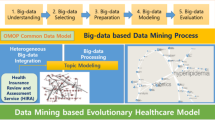Abstract
To overcome the limitations of the conventional medical service in terms of ageing and chronic diseases, AmI-based precision medicine has drawn particular attention. Precision medicine is a customized personal medical service using various information technologies such as personal health device, AI algorithm, image recognition, voice recognition, and natural language processing. In particular, the information technologies for follow-up care services for patients, such as context awareness, context information, and inference rules, are required. In PHD, contexts such as variable data include blood pressure, BMI, blood sugar, weather, and food. It has time-series characteristics, meaning that it changes often with time. Other kinds of health-related information, such as age, family history, smoking, and residential area, are intermittently changed. For inference that is highly related to a user, the context collected through AmI is presented with ontology. Ontology consists of a user’s ambient data, weather data, and lifelog. Context is changed along with a user’s ambient conditions and time. An inference engine is used to create the knowledge base and predict a change. This study proposes a neural-network based adaptive context prediction model for ambient intelligence. This is a learning model using neural network to calculate the similarity for recommendation in a mining lifecare platform. In a conventional prediction procedure, an error is used to update a weight. The proposed model learns the similarity weight of the users to become adapted to the user’s ambient. Based on the knowledge base, user clustering and deviation from mean are applied to calculate the similarity weight. Collaborative filtering technology is used to predict a user’s context and learn the similarity weight repeatedly using a neural network. According to the performance evaluation, the proposed neural-network based similarity weight method had the highest accuracy of prediction when the learning rate was 0.001. Consequently, we found that AmI is a new added-value technology to maintain a healthy lifestyle and contributes to developing the healthcare industry and improving the quality of life.






Similar content being viewed by others
Explore related subjects
Discover the latest articles, news and stories from top researchers in related subjects.References
Adomavicius G, Tuzhilin A (2011) Context-aware recommender systems. In: Recommender systems handbook, pp 217–253
Agrawal R, Srikant R (1994) Fast algorithms for mining association rules. In: Proceedings of the 20th international conference on very large data bases, VLDB 1215, pp 487–499
Agrawal R, Srikant R (1995) Mining sequential patterns. In: Proceedings of the eleventh international conference on data engineering, USA, pp 3–14
ATHENA Standard Vocabulary (2018) Observational health data sciences and informatics [online]. https://www.ohdsi.org. Accessed 16 Apr 2018
Atzori L, Iera A, Morabito G (2010) The internet of things: a survey. Comput Netw 54(15):2787–2805
Chaib A, Boussebough I, Chaoui A (2018) Adaptive service composition in an ambient environment with a multi-agent system. J Ambient Intell Humaniz Comput 9(2):367–380
Chen T, Tsai HR (2018) Application of industrial engineering concepts and techniques to ambient intelligence: a case study. J Ambient Intell Humaniz Comput 9(2):215–223
Chung K, Park RC (2018) Chatbot-based healthcare service with a knowledge base for cloud computing. Clust Comput. https://doi.org/10.1007/s10586-018-2334-5
Chung K, Kim JC, Park RC (2016) Knowledge-based health service considering user convenience using hybrid Wi-Fi P2P. Inf Technol Manag 17(1):67–80
HL7 (2018) Health Level Seven International [online]. http://www.hl7.org. Accessed 16 Apr 2018
Linden G, Smith B, York J (2003) Amazon. com recommendations: Item-to-item collaborative filtering. IEEE Internet Comput 7(1):76–80
Jung H, Chung K (2016a) Knowledge-based dietary nutrition recommendation for obese management. Inf Technol Manag 17(1):29–42
Jung H, Chung K (2016b) Life style improvement mobile service for high risk chronic disease based on PHR platform. Clust Comput 19(2):967–977
Jung EY, Kim JH, Chung K, Park DK (2013) Home health gateway based healthcare services through U-health platform. Wirel Pers Commun 73(2):207–218
Jung H, Yoo H, Chung K (2016) Associative context mining for ontology-driven hidden knowledge discovery. Clust Comput 19(4):2261–2227
Kim JC, Chung K (2017) Emerging risk forecast system using associative index mining analysis. Clust Comput 20(1):547–558
Kim JC, Chung K (2018) Mining health-risk factors using PHR similarity in a hybrid P2P network. Peer-to-Peer Netw Appl. https://doi.org/10.1007/s12083-018-0631-7
Medical Statistics Information (2017) Health insurance review and assessment service (HIRA) [online]. http://opendata.hira.or.kr. Accessed 2017
Orciuoli F, Parente M (2017) An ontology-driven context-aware recommender system for indoor shopping based on cellular automata. J Ambient Intell Humaniz Comput 8(6):937–955
Rho MJ, Kim HS, Chung K, Choi IY (2016) Factors Influencing the Acceptance of Telemedicine for Diabetes Management. Cluster Comput 18(1):321–331
Sarwar B, Karypis G, Konstan J, Riedl J (2001) Item-based collaborative filtering recommendation algorithms. In: Proceedings of the 10th international conference on World Wide Web, ACM, pp 285–295
Song CW, Jung H, Chung K (2017) Development of a medical big-data mining process using topic modeling. Clust Comput. https://doi.org/10.1007/s10586-017-0942-0
Yao J, Warren S (2005) Applying the ISO/IEEE 11073 standards to wearable home health monitoring systems. J Clin Monit Comput 19(6):427–436
Yoo H, Chung K (2018) Mining-based lifecare recommendation using peer-to-peer dataset and adaptive decision feedback. Peer-to-Peer Netw Appl. https://doi.org/10.1007/s12083-017-0620-2
Acknowledgements
This work was supported by Kyonggi University Research Grant 2017.
Author information
Authors and Affiliations
Corresponding author
Additional information
Publisher’s Note
Springer Nature remains neutral with regard to jurisdictional claims in published maps and institutional affiliations.
Rights and permissions
About this article
Cite this article
Kim, JC., Chung, K. Neural-network based adaptive context prediction model for ambient intelligence. J Ambient Intell Human Comput 11, 1451–1458 (2020). https://doi.org/10.1007/s12652-018-0972-3
Received:
Accepted:
Published:
Issue Date:
DOI: https://doi.org/10.1007/s12652-018-0972-3




